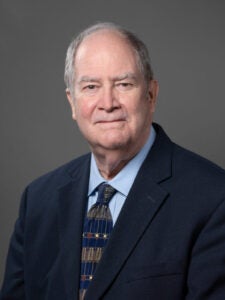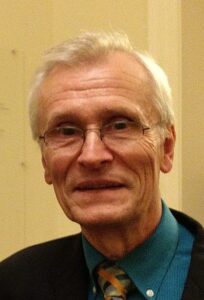Emeritus Faculty
Paula Q. Barrett, PhD
 Professor Emerita
Professor Emerita
email: pgb4b@virginia.edu
The Ionic Regulation of Aldosterone Production in Health and Disease.
Aldosterone excess is a pathogenic factor in many hypertensive disorders. The discovery of numerous somatic and germline mutations in ion channels in Primary Hyperaldosteronism underscores the importance of plasma membrane conductances in determining the activation state of aldosterone-producing zona glomerulosa cells. In the adrenal gland, zona glomerulosa cells within their native rosette assemblies are electrically excitable, generating periodic voltage spikes and coordinated bursts of calcium oscillations, which drive aldosterone production. What conductances underlie this behavior, how their dysfunction contributes to disease and how rosette activity can be reprogramed to attain a desired level of healthy rosette performance continues to be a challenge going forward and remains an alluring interest.
Carl Creutz, PhD

Harrison Professor of Medical Teaching in Pharmacology, Emeritus
email: cec3n@virginia.edu
After receiving a B.S. in Physics at Stanford University (1969), an M.S. in Physics from the University of Wisconsin(1970), and a Ph.D. in Biophysics from Johns Hopkins University (1976), Dr. Creutz conducted basic research in molecular and cell biology at the NIH in Bethesda, MD (1976-1981). In 1981 he was recruited to the Department of Pharmacology at the University of Virginia as an Assistant Professor. In 1987 he was promoted to Associate Professor, and in 1994 to Full Professor. In 2003 Dr. Creutz was elected as the Harrison Professor of Medical Teaching in Pharmacology.
From 1985 to 1990 Dr. Creutz’s research program was supported by an Established Investigator Fellowship from the American Heart Association. During a sabbatical leave in 1995 to 1996 Dr. Creutz served as an NIH-funded Fogarty Senior International Fellow at the Centre de Genetique Moleculaire at the CNRS in Gif-sur-Yvette, France. During a sabbatical leave in 2008 Dr. Creutz served as the Thomas Jefferson Visiting Fellow at Downing College, University of Cambridge, England.
Dr. Creutz’s research program has focused on the roles of calcium-dependent, membrane-binding proteins in exocytosis and other membrane-based phenomena in stimulated cells and has led to several novel and expanding areas of research including the following. Annexins. Dr. Creutz discovered the annexin family of calcium-dependent proteins, and explored their functional roles in exocytosis, endocytosis and membrane repair in health and disease. Synaptotagmins. Dr. Creutz’s group conducted some of the original characterization of the biochemical and membrane-binding activities of the calcium-binding domains of synaptotagmin, a protein that regulates membrane fusion in exocytosis in neurons and other cells. Copines. During his sabbatical in France Dr. Creutz discovered a novel group of calcium-dependent proteins he named copines in the model organism Paramecium tetraaurelia. Subsequently his group characterized copines from a number if different organisms and provided a detailed biochemical characterization of the major human copine, copine I.
Dr Creutz has made major contributions to the teaching programs of the Department and the University. He has trained 13 postdoctoral fellows in his laboratory, and 11 graduate students who received Ph.D.’s in pharmacology, microbiology, biophysics, or neuroscience. He also provided research training in his laboratory to 28 undergraduate students. Since 1990 he has taught the General Principles of Pharmacology to over 2,400 first and second year medical students.
In the future Dr. Creutz anticipates continuing scholarly activities at a reduced pace but perhaps in a broader scope.
James C. Garrison, PhD
Patrice Guyenet, PhD
 Professor Emeritus
Professor Emeritus
email: pgg@virginia.edu
Dr. Guyenet joined the faculty of the University of Virginia School of Medicine, Department of Pharmacology in 1978 to pursue research focused on the autonomic nervous system and breathing. The two axes of this research, including the regulation of blood pressure and breathing automaticity, are directly linked to the prevalent problems of hypertension and breathing disorders such as sleep apnea. Dr. Guyenet has been continuously supported by the National Institutes of Health, Heart, Lung and Blood Institute and has published over 230 scientific articles until his official retirement in January of 2021 when his lab was officially closed and he became Professor emeritus. Since this date Dr. Guyenet has continued his involvement in Neuroscience and Pharmacology research by collaborating with Prof. Bayliss (Pharmacology) and mentoring Pharmacology Asst-Prof Abbott and his staff. Dr. Guyenet has also kept his contribution to the Pharmacology Department teaching, he has edited a two-volume book series on Respiratory neurobiology (Handbook of Clinical Neurology vols 188 & 189), written an extensive review on breathing and CO2 homeostasis, reviewed numerous manuscripts for Journals such as Science, Nature, Neuron, J Physiol and attended specialized scientific meetings.
Michael Johnson, PhD
 Professor Emeritus
Professor Emeritus
email: mlj8e@virginia.edu
Research Interest: Mathematical modeling of biological processes
Selected Pubications:
Baich A and Johnson M. Evolutionary Advantage of Control of a Biosynthetic Pathway, Nature. 1968;218:464-465.
Johnson ML, Turner BW and Ackers GK, A Quantitative Model for the Cooperative Mechanism of Human Hemoglobin. Proceedings of the National Academy Sciences – U.S.A. 1984;81:1093-1097.
Johnson ML, The Analysis of Ligand Binding Data with Experimental Uncertainties in the Independent Variables. Analytical Biochemistry 148, 471-478.
Lampl M, Veldhuis JD and Johnson ML. Saltation and Stasis: A Model of Human Growth. Science. 1992;258:801-803; reprinted le Journal Internationale de Medicine 254, 45-48.
Lakowicz JR, Szmacinski H, Nowaczyk K and Johnson ML. Fluorescence Lifetime Imaging of Free and Protein-Bound NADH. Proceedings of the National Academy Sciences – U.S.A. 1992;89:1271-1275.
Johnson ML, Veldhuis PP and Evans WS. Signal-Response Modeling of Partial of Hormonal Feedback Networks. Journal of Diabetes Science and Technology. 2009;3:34-43.
John Lazo, PhD
 Professor Emeritus
Professor Emeritus
email: lazo@virginia.edu

 Professor Emeritus
Professor Emeritus Professor Emerita
Professor Emerita